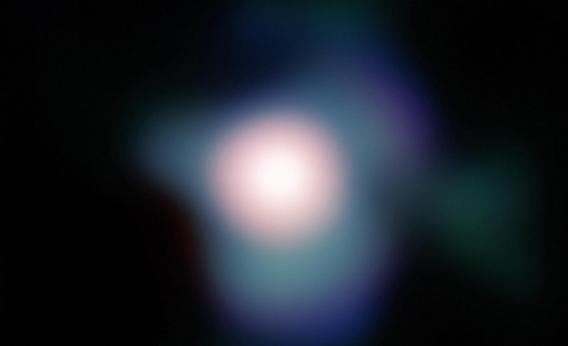In college, my English-major mother took a course called “Physics for Poets” (and disparagingly called “Physics for Dummies” by the hard-sci set). Now, the new field of asteroseismology is vindicating her, proving that science indeed contains a share of lyricism. With the help of the Kepler telescope, researchers have discovered a distant star system consisting of a gaseous giant orbited by a small rocky planet—just like the Earth rotating around the sun. The lovely part is that in order to know where even to aim their instruments to detect the pair, the scientists needed to listen to star song. Esther Inglis-Arkell over at io9 explains:
Instead of examining occasional, fitful tremors, sun-like stars have a deep resonance. The internal sound waves of the star are trapped inside, moving back and forth. Eventually they achieve a specific vibration, the way a musical note resonates in a tuning fork. This vibration causes the outside of the star to pulse, gently, like it’s breathing. The deeper the resonance, the larger the star. By tracking this resonance, researchers are able to find its size, and from there, they’re able to track its light and motion to detect planets.
So the scientists would not have spotted the Earth-like rock without parsing its neighbor’s astral soundtrack. And like Charles Darwin carrying his volume of Milton through South America, they had to have been aware that the space between their work and the poet’s (whose eye, after all, “doth glance from heaven to earth, from earth to heaven”) isn’t so, well, astronomical. We thought we’d leave you with these stanzas from Midwestern poet David Wagoner’s “The Silence of the Stars”:
When Laurens van der Post one night
In the Kalihari Desert told the Bushmen
He couldn’t hear the stars
Singing, they didn’t believe him. They looked at him,
Half-smiling. They examined his face
To see whether he was joking
Or deceiving them. Then two of those small men
Who plant nothing, who have almost
Nothing to hunt, who live
On almost nothing, and with no one
But themselves, led him away
From the crackling thorn-scrub fire
And stood with him under the night sky
And listened. One of them whispered,
Do you not hear them now?
On some clear nights
When nearby houses have turned off their televisions,
I can still hear what I thought
At the edge of silence where the inside jokes
Of my heartbeat, my arterial traffic,
The C above high C of my inner ear, myself
Tunelessly humming, but now I know what they are:
My fair share of the music of the spheres
And clusters of ripening stars,
Of the songs from the throats of the old gods
Still tending even tone-deaf creatures
Through their exiles in the desert.
